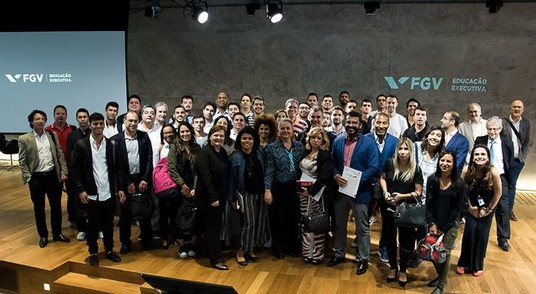
On 25th August, over 300 participants attended the FGV/CIES/FMA Seminar held at the campus of Fundação Getúlio Vargas, who have been the CIES academic partner in Brazil since 2010.
The event was organised within the framework of the FGV/FIFA/CIES Executive Programme in Sports Management. It brought together numerous experts who discussed the role of sport in human progress and in the development of society and the economy.
Following preliminary remarks made by Ana Paula Borges Gonçalves (Head of online training programmes at FGV) and Pedro Trengrouse, (Academic Coordinator of the FGV/FIFA/CIES Executive Programme, FMA alumnus and organizer of the seminar), Mgr Melchor Sánchez de Toca y Alameda who is the undersecretary of the Pontifical Council for Culture, addressed the issue of the changing perceptions of sport and its wider significance in today’s world.
Viðar Halldórsson, Associate Professor at the University of Iceland, then gave a talk on the outstanding sporting successes of his country over the last decade. He emphasised the impact of state policies focused on the essential notion of clubs as a factor of social cohesion and working with young people to promote values "against current trends" such as "local", "amateur", "having fun in sport" and "community and team spirit" in sport.
Ambassador Vera Cintia Alvarez, General Coordinator for sports cooperation with the Brazilian Ministry of Foreign Relations, addressed the increasing importance of sport as a "soft power" tool in the communication policy of governments.
In the afternoon, Paulo Wanderley, President of the Brazilian Olympic Committee, and Mizael Conrado, President of the Brazilian Paralympic Committee, highlighted the role played by the values of Olympism in modern society, as well as the substantial work undertaken to make sport a factor of social integration, and, in particular, for persons with disabilities.
Later, two historians, CIES Scientific Coordinator Prof. Pierre Lanfranchi, and Prof. Lamartine Pereira da Costa, Olympic Academy and Universidade do Estado do Rio de Janeiro, discussed new trends in sports museology and the historical importance of sport and football, in particular in Brazil.
Finally, Ricardo Trade, CIES Coordinator in Brazil and CEO of the 2014 FIFA World Cup Brazil, moderated a round table including several representatives of Brazilian sport: Daniel Dias (multi Paralympic champion), Flavio Canto (Olympic medallist), Ana Moser (Olympic medallist), Isabel Swan (Olympic medallist), Samuel Gonçalves ("Project Grael" ambassador) and Marcelo Barreto (sports journalist). They discussed various plans and projects, thereby showing to what extent sport can play a decisive role in upholding human dignity.
Several leading figures in Brazilian sport took part in the seminar, including footballer and former Ballon d’Or award winner Ricardo Izecson dos Santos Leite, better known as Kaká, who will also be a student on the next edition of the FGV/FIFA/CIES Executive Programme.
Furthermore, many students and alumni from the Executive Programme and FIFA Master attended the event, which clearly demonstrates the quality and dynamism of the CIES education programmes.
The seminar ended with a fantastic performance by the musical group Ação Social Pela Música do Brasil, who provided undeniable proof that, like sport, music is also a fabulous tool for inclusion, joy and sharing.
The next seminar, which will take place in March 2019, will focus on the role of women in sport.
This website uses cookies – limited to technical and analytical cookies – in order to allow your browsing and enhance your experience.
For more information, please see our cookie policy and our privacy notice.